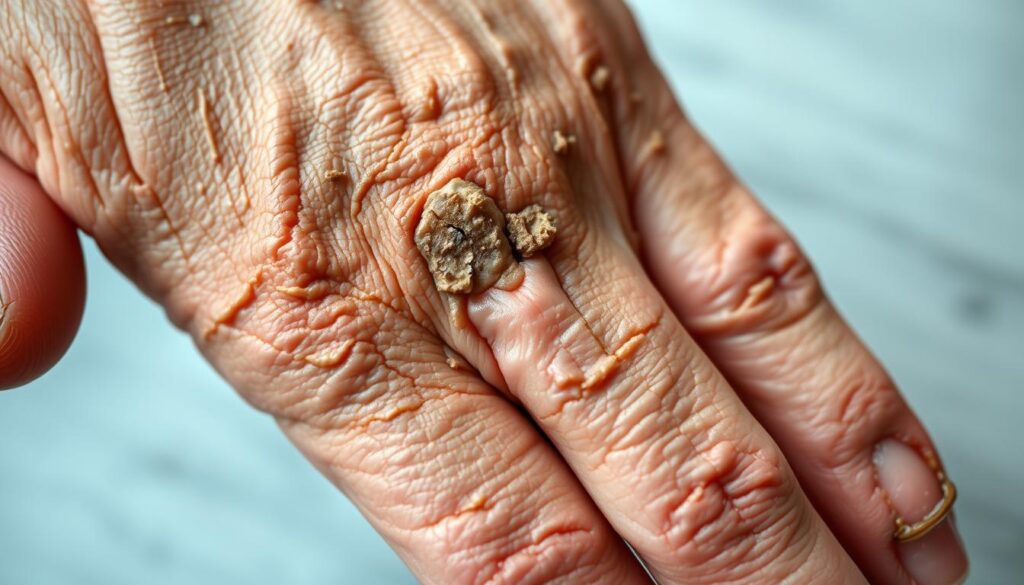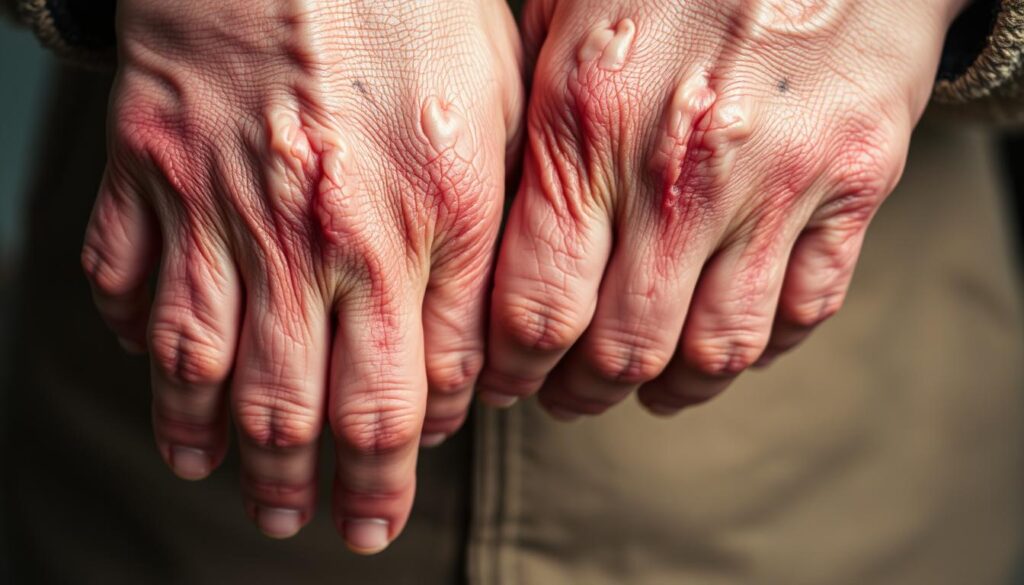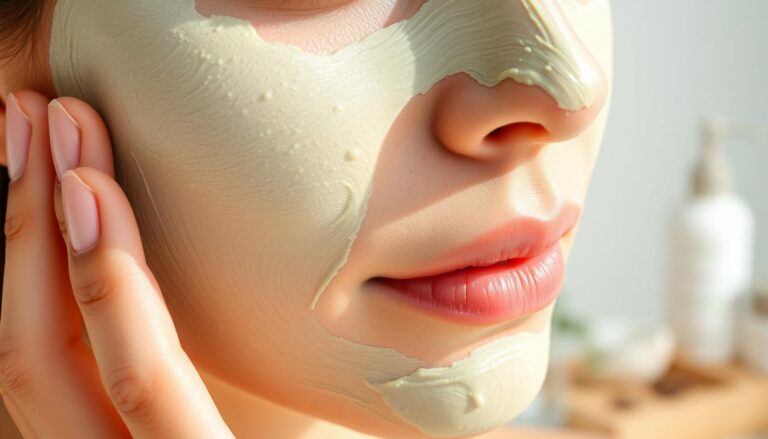At Glowskinhub.com, we believe beauty isn’t just a look—it’s a feeling

How to treat dry and itchy skin in winter UK
Winter in the UK can be harsh on the Skin, leaving it feeling dry and itchy. The cold weather, combined with indoor heating, strips the Skin of its natural moisture, leading to discomfort and irritation.
Finding effective dry Skin treatment and itchy Skin relief is crucial for maintaining healthy and comfortable Skin during these months. A good winter Skin care routine can make a significant difference.
Key Takeaways
- Moisturise regularly to combat dryness
- Avoid harsh soaps that strip Skin of its natural oils
- Stay hydrated to keep Skin healthy from the inside out
- Use gentle exfoliants to remove dead Skin cells
- Consider using a humidifier to maintain a healthy moisture level in the air
Why British Winters Are Particularly Harsh on Skin
British winters are known for their harsh impact on Skin health, primarily due to the cold and damp climate. The combination of low temperatures and high humidity can strip the Skin of its natural moisture, leading to dryness and irritation.
The Impact of UK’s Damp Cold Climate
The UK’s damp cold climate is particularly challenging for Skin care. The cold air lacks moisture, while the dampness can make the Skin more prone to dryness. This dual effect can exacerbate Skin conditions, making it essential to adopt a robust skincare routine during the winter months.
How Indoor Heating Affects Skin Moisture
Indoor heating is another significant factor that affects Skin moisture during British winters. Different heating systems have varying impacts on Skin dryness.
Central Heating Systems vs. Radiators
| Heating System | Effect on Skin Moisture |
|---|---|
| Central Heating Systems | Dry out the air, reducing Skin moisture |
| Radiators | Can cause localized dryness, but may be less harsh than central heating |
Understanding these factors can help in choosing the right skincare approach to combat dry and itchy Skin during British winters.

Common Causes of Dry and Itchy Skin During British Winters
Dry and itchy Skin is a common complaint during the UK’s winter months, stemming from a combination of environmental and lifestyle factors. Understanding these causes is the first step towards effective management and relief.
Environmental Factors in UK Cities vs. Countryside
The UK’s diverse geography means that environmental factors vary significantly between urban and rural areas. Cities tend to have poorer air quality due to higher concentrations of pollutants, which can strip the Skin of its natural moisture.
In contrast, the countryside often has cleaner air but can be much colder and windier, leading to increased moisture loss.
Hot Showers and Baths
Hot water can be particularly harsh on the Skin during winter, stripping it of its natural oils and leading to dryness and itchiness. Reducing the temperature of showers and baths can help mitigate this effect.
Wool Clothing and Synthetic Fabrics
The choice of clothing can also impact Skin health. While wool is a natural, breathable fabric, some people may find it irritating. Synthetic fabrics, on the other hand, can trap moisture and irritate the Skin.
| Factor | Effect on Skin | Recommendation |
|---|---|---|
| Environmental Pollutants | Strip natural moisture | Use protective skincare products |
| Hot Water | Removes natural oils | Reduce water temperature |
| Wool/Synthetic Clothing | Irritation, moisture trapping | Choose breathable, natural fabrics |

Identifying Different Types of Winter Skin Conditions
Dry and itchy Skin is a common complaint during the UK’s winter months, but identifying the specific condition is crucial.

Winter Skin conditions can range from mild dryness to severe Skin diseases. Understanding the differences is key to effective management.
Eczema Flare-ups: A Common UK Problem
Eczema, also known as dermatitis, is a condition that makes the Skin red and itchy. It’s a common issue in the UK, particularly during the dry winter months.
Eczema treatment typically involves moisturising regularly, avoiding harsh soaps, and sometimes using topical steroids.
Psoriasis Management in Cold Weather
Psoriasis is another Skin condition that can be exacerbated by the cold, dry air of British winters. Managing psoriasis involves a combination of psoriasis management techniques, including topical treatments, light therapy, and lifestyle adjustments.
General Xerosis (Dry Skin) Symptoms
General xerosis, or dry Skin, is a common condition during winter. Symptoms include dryness, itchiness, and sometimes cracking of the Skin.
Distinguishing Between Normal Dryness and Medical Conditions
While dry Skin is common in winter, persistent or severe dryness could be a sign of an underlying medical condition. It’s essential to distinguish between normal dryness and conditions like eczema or psoriasis.
If you experience persistent itching, redness, or cracking, it may be time to consult a healthcare professional for proper diagnosis and treatment.
Essential Daily Skincare Routine for British Winter Months
As the British winter sets in, it’s crucial to adjust your skincare routine to combat the harsh weather conditions. The cold air and low humidity levels can strip your Skin of its natural moisture, leading to dryness and irritation.
Morning Protection Routine
Starting your day with the right skincare products is essential. Use a gentle cleanser that doesn’t strip your Skin of its natural oils, followed by a moisturiser that provides a barrier against the cold air. Look for products containing ingredients like hyaluronic acid and ceramides. As “The key to healthy Skin is consistency and using the right products for your Skin type.”
A broad-spectrum sunscreen with at least SPF 30 is also crucial, even on cloudy days, to protect your Skin from UV damage.
Evening Repair Regimen
In the evening, focus on repairing and nourishing your Skin. Use a gentle exfoliator a few times a week to remove dead Skin cells and improve Skin texture. Follow this with a rich moisturiser or night cream that contains ingredients like shea butter and glycerin to lock in moisture.
Weekly Treatments for Deep Hydration
Incorporating weekly treatments can provide an extra layer of hydration. Consider using a hydrating face mask or a nourishing overnight treatment.
Adapting Your Routine to UK Weather Forecasts
Stay informed about the weather forecast and adjust your skincare routine accordingly. On particularly cold or windy days, consider using more intensive moisturising products.
“Adapting your skincare routine to the weather can make a significant difference in maintaining healthy, hydrated Skin throughout the winter.”

How to Treat Dry and Itchy Skin in Winter UK: Expert Methods
To alleviate dry and itchy Skin, it’s essential to adopt expert-recommended methods tailored to the UK’s winter conditions. The cold weather, coupled with indoor heating, can strip the Skin of its natural moisture, leading to dryness and itchiness.
NHS-Recommended Treatment Approaches
The NHS recommends using emollients to treat dry Skin. Emollients help to lock moisture into the Skin, reducing dryness and itchiness. They should be applied regularly, especially after bathing.
Key emollient ingredients include urea, hyaluronic acid, and ceramides. These ingredients help repair the Skin’s barrier function.

British Dermatologists’ Top Advice
British dermatologists emphasize the importance of a consistent skincare routine during winter. This includes gentle cleansing, regular moisturizing, and avoiding harsh products that can strip the Skin of its natural oils.
- Use gentle, Fragrance-free cleansers.
- Apply moisturizer immediately after bathing.
- Avoid extreme water temperatures.
Prescription vs. Over-the-Counter Solutions
For mild dry Skin, over-the-counter (OTC) moisturizers and emollients are often sufficient. However, for more severe cases, prescription-strength treatments may be necessary.
| Treatment Type | Severity of Dry Skin | Examples |
|---|---|---|
| Over-the-Counter | Mild | Moisturizers, emollients |
| Prescription | Moderate to Severe | Steroid creams, stronger emollients |
Understanding the difference between OTC and prescription treatments can help individuals choose the most effective solution for their dry and itchy Skin.
Best Moisturisers for Dry Skin Available in British Shops
British winters can be unforgiving on our Skin, making the choice of moisturiser crucial for hydration and comfort. The right moisturiser can help lock in moisture and protect the Skin from harsh weather conditions.

High Street Options
High street stores like Boots, Superdrug, and Holland & Barrett offer a wide range of moisturisers. Boots’ own brand offers excellent value, with products like their Boots E45 cream being highly recommended for dry Skin.
Luxury Department Store Brands
For those looking to splurge, luxury department stores such as M&S and John Lewis offer high-end moisturisers. Brands like La Mer and Dr. Hauschka are popular for their hydrating properties and luxurious textures.
Budget-Friendly Alternatives That Actually Work
Effective moisturisers don’t have to break the bank. Stores like Asda and Tesco offer affordable options that are rich in moisturising ingredients. Look out for products with ingredients like shea butter and glycerin.
Fragrance-Free Options for Sensitive Skin
For those with sensitive Skin, Fragrance-free moisturisers are a must. Brands like Cetaphil and Avene offer gentle, non-irritating formulas that provide long-lasting hydration without the risk of allergic reactions.
By choosing the right moisturiser, individuals can find significant dry Skin relief. Whether you’re on a budget or looking to invest in a luxury product, there’s a moisturiser out there for everyone. Even those with oily Skin can find suitable oily Skin moisturizer options that won’t clog pores.
Hydrating Your Skin from Within: British Diet Considerations
While topical skincare is essential, a British diet rich in certain nutrients can significantly enhance Skin hydration during winter. Incorporating the right foods and staying hydrated can help combat dry, itchy Skin.
Seasonal UK Foods That Combat Dry Skin
During the winter months, the UK offers a variety of seasonal foods that can help hydrate the Skin. Some of these include:
- Root Vegetables: Carrots, sweet potatoes, and parsnips are rich in vitamins and minerals that support Skin health.
- Fatty Fish: Salmon and mackerel, readily available in UK supermarkets, are high in omega-3 fatty acids, which help reduce inflammation and promote hydrated Skin.
- Nuts and Seeds: Almonds, sunflower seeds, and pumpkin seeds are excellent sources of vitamin E, supporting Skin health.
Optimal Hydration During Cold Months
Staying hydrated is crucial, even in cold weather. Drinking plenty of water and consuming hydrating foods like soups and stews can help maintain Skin moisture. Aim for at least 2 litres of water a day, adjusting according to your activity level.
Supplements Available in UK Health Stores
For additional support, consider supplements available in UK health stores. Omega-3 fatty acid supplements, vitamin D, and probiotics can help maintain Skin health during the winter. Always consult with a healthcare professional before starting any new supplement regimen.

By combining a balanced diet with proper hydration and the right supplements, you can help keep your Skin healthy and hydrated throughout the British winter.
Bathing and Showering Practices to Preserve Skin Moisture
Adopting the right bathing practices is crucial for maintaining Skin moisture during the harsh British winters. The cold climate, combined with indoor heating, can strip the Skin of its natural oils, leading to dryness and itchiness.
Ideal Water Temperature in Hard Water Areas
Using lukewarm water instead of hot water can help preserve the Skin’s natural moisture barrier. In areas with hard water, the high mineral content can further dry out the Skin. Reducing water temperature can mitigate this effect.
Best Cleansers Available in UK for Winter Skin
Choosing the right cleanser is vital for winter Skin care. Look for gentle, moisturising cleansers that are formulated for dry Skin. Brands available in the UK, such as Cetaphil and E45, offer products that clean without stripping the Skin of its natural oils.
Post-Shower Moisturising Techniques
Moisturising immediately after showering is key to locking in moisture. Using a moisturiser that contains ingredients like hyaluronic acid or ceramides can be particularly effective.
Bath Additives for Extra Hydration
Adding bath oils or colloidal oatmeal to your bath can provide extra hydration. These additives help to soothe dry Skin and enhance the overall moisturising effect of your bathing routine.
By adjusting your bathing practices, you can significantly improve your Skin’s moisture levels during the winter months.
Home Remedies and DIY Treatments Using British Pantry Staples
The cold UK winters often leave Skin feeling dry and irritated, yet home remedies offer a gentle solution. Many effective treatments can be concocted using common British pantry staples.
Kitchen Ingredients for Nourishing Masks
Creating nourishing face masks with kitchen ingredients is a simple and cost-effective way to combat dry Skin. Ingredients like honey, avocado, and oatmeal are readily available in most UK kitchens and are known for their moisturizing properties. For instance, a mask made from mashed avocado and honey can provide intense hydration.
Natural Oils Available in UK Supermarkets
Natural oils such as coconut oil, olive oil, and almond oil are excellent for locking in moisture. These oils are easily found in UK supermarkets and can be used as moisturizers or as part of a bath routine to help soothe dry Skin.
Traditional British Remedies Passed Down Generations
Some traditional British remedies have been passed down through generations, offering effective relief for dry and itchy Skin. For example, using elderflower or chamomile infusions as a Skin toner can help calm irritated Skin. These natural remedies are not only effective but also gentle on the Skin.
Creating a Skin-Friendly Home Environment During British Winter
To keep your Skin healthy and hydrated during the British winter, it’s essential to create a nurturing home environment.
One of the key factors in maintaining Skin health at home is controlling the humidity levels. Dry air can exacerbate dry Skin conditions, making humidifiers a valuable addition to your home.
Humidifiers: Types and Recommendations for UK Homes
There are several types of humidifiers available in the UK market, including:
- Cool mist humidifiers
- Warm mist humidifiers
- Ultrasonic humidifiers
- Evaporative humidifiers
When choosing a humidifier, consider the size of your space and the level of humidity you need to maintain.
Optimal Heating Settings to Prevent Skin Dryness
Adjusting your heating settings can also help prevent Skin dryness. Keeping your home at a consistent, moderate temperature can help maintain Skin hydration.
Air Quality Considerations in Urban vs. Rural Settings
Air quality varies significantly between urban and rural settings in the UK. In urban areas, air pollution can be a significant factor in Skin health. Using air purifiers can help mitigate this issue.
By implementing these measures, you can create a more Skin-friendly home environment that supports your Skin health throughout the British winter.
When to Seek Medical Help for Winter Skin Issues in the UK
The harsh British winter can be particularly unforgiving on the Skin, making it essential to understand when to consult a healthcare professional. While many cases of dry and itchy Skin can be managed with home remedies and over-the-counter treatments, there are instances where medical help is necessary.
Warning Signs That Require GP Consultation
If you experience any of the following symptoms, it’s advisable to consult your GP: persistent itching that disrupts sleep, cracked or bleeding Skin, signs of infection such as redness, swelling, or pus, or if your Skin condition is severely impacting your daily life.
Navigating NHS Services for Skin Problems can be straightforward. You can start by contacting your GP, who can assess your condition and provide a referral to a dermatologist if necessary. The NHS also offers online resources and helplines for initial guidance.
Navigating NHS Services for Skin Problems
The NHS provides comprehensive services for Skin issues. You can:
- Contact your GP for an initial assessment
- Access NHS online resources for guidance
- Use NHS 111 for non-emergency advice
Private Dermatology Options and Costs
For those preferring private healthcare, numerous dermatology clinics are available across the UK. Costs can vary significantly depending on the specialist and treatment required.
| Service | Average Cost |
|---|---|
| Dermatologist Consultation | £150-£300 |
| Diagnostic Tests | £100-£500 |
| Prescription Treatments | £50-£200 |
Telehealth Services for Skin Consultations
Telehealth has become an increasingly popular option for Skin consultations, offering convenience and often reduced costs. Many private providers now offer online consultations with dermatologists.
Conclusion: Maintaining Healthy Skin Throughout the British Winter
As the British winter sets in, maintaining healthy Skin requires a combination of the right skincare routine and a Skin-friendly lifestyle. By understanding the causes of dry and itchy Skin, such as the harsh UK climate and indoor heating, you can take proactive steps to protect your Skin.
Establishing a consistent skincare routine is crucial, including using the best moisturisers for dry Skin available in British shops, such as those found in Boots or Superdrug, and adopting gentle bathing practices. Additionally, incorporating seasonal UK foods that combat dry Skin into your diet can help hydrate your Skin from within.
By following the expert advice and tips outlined in this article, you can enjoy healthy, resilient Skin throughout the British winter. Whether you have oily Skin and are looking for the best skincare routine for oily Skin or are dealing with dryness and itchiness, the right approach can make all the difference in maintaining healthy Skin during the cold winter months.





